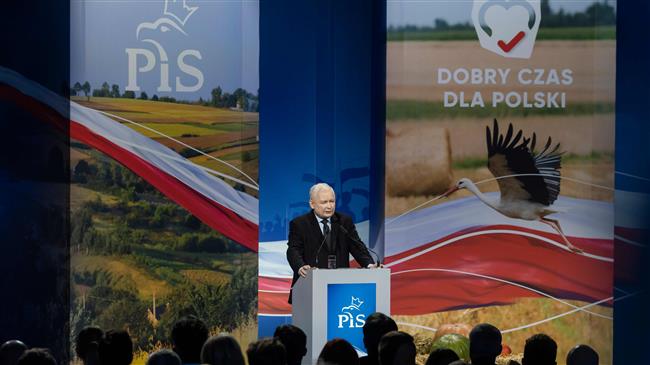Poland's right-wing could lose absolute majority in vote: polls
Poland's governing Law and Justice (PiS) party could lose the absolute majority it has enjoyed since 2015, according to the final opinion polls published before Sunday's general election.
The right-wing PiS would take 41.7 percent of the vote, barely ahead of three political groups that could form an alliance against it, according to an Ibris institute survey for the centrist Rzeczpospolita daily released Friday.
Of the three parties, the centrist Civic Coalition (KO) could take 22 percent, the leftists 13.4 percent and the centre-right Polish Coalition six percent -- a total of 41.4 percent, the poll found.
With such a tiny gap, it is possible that the results could reverse, especially if turnout is high, as the survey predicts.
The survey also found that 11.5 percent of respondents were still undecided.
Another opinion poll carried out by the Kantar institute and published Thursday by the liberal daily Gazeta Wyborcza found that the PiS would receive 40 percent of the vote.

It showed the KO would garner 26 percent, the leftists 12 percent and the Polish Coalition seven percent -- for a total of 45 percent.
The survey also found that the far-right Confederation would secure seven percent of the vote and would enter parliament, thus reducing the number of seats obtained by the other parties.
However, the Hondt method, which is used in Poland to calculate the distribution of seats, offers a bonus to the winning party, which will most likely be the PiS.
There are three likely scenarios. The PiS could retain its absolute majority and continue to govern alone, pursuing the controversial reforms it has introduced in domains like the judiciary.
If the party receives fewer votes, it could look to form a coalition or poach a few lawmakers from other groups, but in that case it would have to limit the scope of its reforms.
Under a third scenario, the opposition parties could perform well and form an anti-PiS coalition government that would have to coexist with the pro-PiS President Andrzej Duda.
The PiS has built up considerable support through its generous social benefits, the backing of the country's powerful Catholic Church and its anti-LGBT stance.
The liberal opposition has accused the conservatives of authoritarian tendencies, while the EU has denounced judicial reforms introduced by the PiS government as a threat to the rule of law and democracy.
(Source: AFP)
President Raeisi: Iran to make Israel rue 'slightest attack'
US, UK imposes new sanctions on Iran over retaliation against Israel
Storm aftermath exposes chaos in Dubai after UAE hit by record rains
VIDEO | Israel’s humiliation
Russia: New US aid for Ukraine fails to change military situation
China slams Biden over 'xenophobic' and 'cheating' claims
VIDEO | Erdogan breaks silence, backs Iran’s reprisal attack on Israel
IRGC warns of 'tit-for-tat' retaliation if Israel attacks Iran's nuclear facilities










 This makes it easy to access the Press TV website
This makes it easy to access the Press TV website